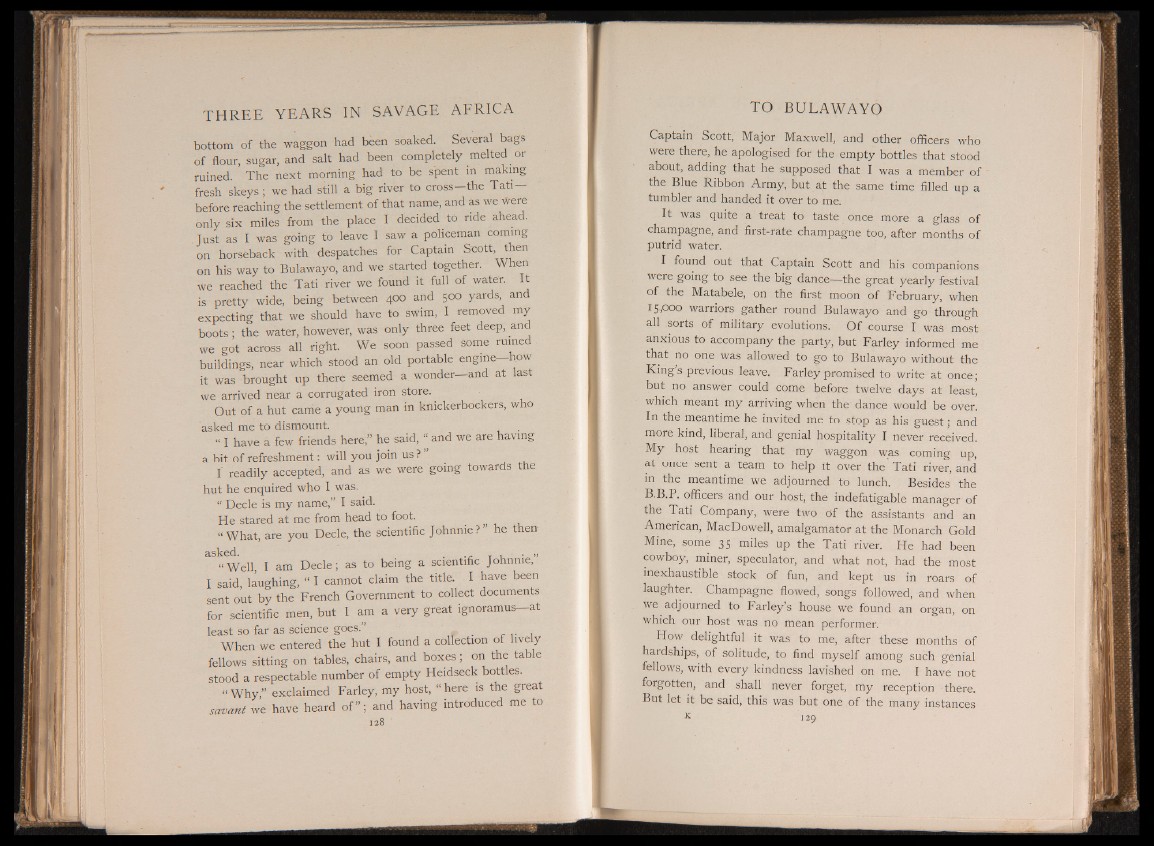
bottom of the waggon had been soaked. Several bags
of flour, sugar, and salt had b e e n completely melted or
ruined. The next morning had to be spent m making
fresh skeys; we had still a big river to cross-the Tati—
before reaching the settlement of that name, and as we were
only six miles from the place I decided to ride ahead.
Just as I was going fo leave I saw a policeman coming
on horseback with despatches for Captain Scott, then
on his way to Bulawayo, and we started together. When
we reached the Tati river we found it full of water. It
is pretty wide, being between 400 and 500 yards, an
expecting that we should have to swim, I removed my
boots; the water, however, was only three feet deep, and
we got across all right. We soon passed some ruined
buildings, near which stood an old portable engine ow
it was brought up there seemed a wonder—and at last
we arrived near a corrugated iron store.
Out of a hut came a young man in knickerbockers, who
asked me to dismount.
“ I have a few friends here,” he said, “ and we are having
a bit of refreshment: will you join us ?
I readily accepted, and as we were going towards the
hut he enquired who I was.
“ Decle is my name,” I said.
He stared at me from head to foot.
“ What, are you Decle, the scientific Johnnie ? ” he then
asked. . )
1 Well I am Decle; as to being a scientific Johnnie,
I said, laughing, “ I cannot claim the title. I have been
sent out by the French Government to collect documents
for scientific men, but I am a very great ignoramus—at
least so far as science goes.”
When we entered the hut I found a collection of lively
fellows sitting on tables, chairs, and boxes; on the table
stood a respectable number of empty Heidseck bottles.
“ Why,” exclaimed Farley, my host, “ here is the great
savant we have heard of” ; and having introduced me to
128
Captain Scott, Major Maxwell, and other officers who
were there, he apologised for the empty bottles that stood
about, adding that he supposed that I was a member of
the Blue Ribbon Army, but at the same time filled up a
tumbler and handed it over to me.
It was quite a treat to taste once more a glass of
champagne, and first-rate champagne too, after months of
putrid water.
I found out that Captain Scott and his companions
were going to see the big dance—the great yearly festival
of the Matabele, on the first moon of February, when
15,000 warriors gather round Bulawayo and go through
all sorts of military evolutions. Of course I was most
anxious to accompany the party, but Farley informed me
that no one was allowed to go to Bulawayo without the
Kings previous leave. Farley promised to write at once;
but no answer could come before twelve days at least,
which meant my arriving when the dance would be over!
In the meantime he invited me to stop as his guest; and
more kind, liberal, and genial hospitality I never received.
My host hearing that my waggon was coming up,
at once sent a team to help it over the Tati river, and
in the meantime we adjourned to lunch. Besides the
B.B.P. officers and our host, the indefatigable manager of
the Tati Company, were two of the assistants and an
American, MacDowell, amalgamator at the Monarch Gold
Mine, some 35 miles up the Tati river. He had been
cowboy, miner, speculator, and what not, had the most
inexhaustible stock of fun, and kept us in roars of
laughter. Champagne flowed, songs followed, and when
we adjourned to Farley’s house we found an organ, on
which our host was no mean performer.
How delightful it was to me, after these months of
hardships, of solitude, to find myself among such genial
fellows, with every kindness lavished on me. I have not
forgotten, and shall never forget, my reception there.
But let it be said, this was but one of the many instances
K 129